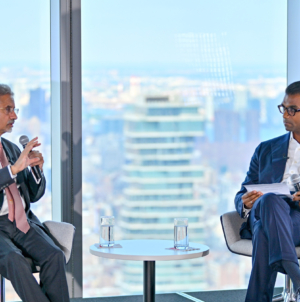-
Exclusive — India Hopes for Imminent US Trade Deal, Minister Tells Newsweek - 27 mins ago
-
Appeals Court Weighs Trump’s Use of Alien Enemies Act for Deportations - 29 mins ago
-
Trump freezes $6.8 billion in education funding; California hit hard - 36 mins ago
-
Bryan Kohberger Plea Deal Sparks Wave of Reaction Online - about 1 hour ago
-
NYC Panel Approves Rent Increases, a Key Issue for Mamdani and Adams - about 1 hour ago
-
Newsom pushes major housing reform through California Legislature - about 1 hour ago
-
Packers Linked to Potential TJ Watt Trade Amid New Rumors - 2 hours ago
-
Idaho Shooting Suspect Identified in Deadly Ambush of Firefighters - 2 hours ago
-
Two brothers went missing three weeks ago. They were found dead along a California highway - 2 hours ago
-
Report: Knicks Expected to Make Major Free Agency Signing - 2 hours ago
Trump’s Favored Tech Titans See Billions Wiped Out in AI Market Sell-Off
A week after some of America’s wealthiest tech billionaires attended Donald Trump’s inauguration, their personal fortunes took a major hit. On Monday, a small Chinese artificial intelligence (AI) startup called DeepSeek singlehandedly wiped billions off the valuations of U.S. tech giants like Nvidia, Broadcom and Microsoft.
Why It Matters
The selloff in U.S. tech stocks on Monday was immediate and brutal, stemming from concerns that DeepSeek, and thus China, has caught up with American companies at the forefront of generative AI—at a fraction of the cost.
Last year, Anthropic CEO Dario Amodei revealed in a podcast that training some AI models could cost as much as $1 billion. DeepSeek reportedly built its LLM (large-language model) for less than $6 million, whereas OpenAI was said to have spent something in the range of $100 million to develop GPT-4. DeepSeek surpassed ChatGPT on the app stores to become the most downloaded app in the U.S. on Monday.
The skyrocketing costs associated with the AI revolution have been a boon for companies like Nvidia, Broadcom, and Marvell, which have thrived on the explosive demand for AI chips and services. But DeepSeek has upended this narrative.
What to Know
Among the biggest losers, at least on paper, of the market rout Monday were Nvidia’s Jensen Huang, Microsoft’s Satya Nadella, and Alphabet’s Sundar Pichai. Pichai had attended Trump’s inauguration alongside Tesla and X CEO Elon Musk, Amazon’s Jeff Bezos, and Meta’s Mark Zuckerberg. It also marked a setback for OpenAI’s Sam Altman, another prominent tech figure spotted at the Capitol Rotunda last week.
At the market close Monday, Nvidia’s stock had fallen 17 percent, erasing nearly $600 billion in market capitalization—the largest one-day loss for any publicly listed company, ever. Put another way, the equivalent of the GDP of Sweden was wiped out from just Nvidia’s value on Monday.
The sharp decline in Nvidia’s stock hit Huang especially hard, with his holdings losing an estimated $20.7 billion in value.
Broadcom, another AI heavyweight, also fell over 17 percent, while bond markets climbed as investors sought safer assets.
The tech-heavy Nasdaq Composite dropped 3.1 percent, with Microsoft and Alphabet losing more than 2.5 percent each.
Market commentators speculated that if OpenAI were publicly traded, its valuation might have suffered an even steeper decline.
Elon Musk’s Tesla, which plays in the AI space via its full self-driving (FSD) and robotaxi initiatives, was down 2.3 percent. Musk’s estimated loss from Monday would be approximately $1.22 billion, based on his 13 percent ownership stake. He spent $44 billion to buy Twitter.
Meanwhile, Meta was one of the few major AI-focused companies to end in the green, with its shares rising 1.91 percent. The Facebook parent, like DeepSeek, keeps its models open-source. Still, concerns persist about its future valuation, as the company announced plans on Friday to invest $60–$65 billion this year to scale up its AI initiatives.

Photo by Shawn Thew-Pool/Getty Images
Apple and Amazon proved resilient, too. Analysts noted that Apple’s focus on integrating AI into its products, rather than building standalone models, has boosted its performance, especially following its latest product launch. Like Meta, Amazon also saw a modest gain, with its stock rising a quarter point in an otherwise sea of red on the Nasdaq.
‘AI Can Turn Into a Commodity’
DeepSeek’s technical breakthrough has ignited a broader debate in the U.S. about how to compete with China on AI. DeepSeek’s success could undermine a key pillar of U.S. foreign policy—restricting the sale of American-designed AI semiconductors to China.
“DeepSeek R1 is AI’s Sputnik moment,” venture capitalist Marc Andreessen wrote on Sunday in a post on the social platform X, referencing the 1957 satellite launch that spurred the Cold War space race.

AP
Andreessen, who has advised Trump on tech policy, warned that overregulating the AI industry could stifle U.S. innovation and give China an advantage.
Microsoft, expected to spend $94 billion on AI development in the next fiscal year, remains bullish despite recent disruptions. CEO Satya Nadella shared a positive outlook on DeepSeek’s emergence, suggesting it could benefit the industry.
“Jevons paradox strikes again!” Nadella wrote on LinkedIn, referencing the economic theory that greater efficiency leads to higher demand. “As AI becomes more efficient and accessible, its adoption will skyrocket, transforming it into an indispensable commodity.”
What People Are Saying
Satya Nadella, CEO of Microsoft, on a post on LinkedIn: “As AI becomes more efficient and accessible, its adoption will skyrocket, transforming it into an indispensable commodity.”
An Nvidia spokesperson in an emailed statement to Newsweek: “DeepSeek’s work illustrates how new models can be created.”
Gregory Allen, director of the Wadhwani AI Center at the Center for Strategic and International Studies, to the Associated Press: “Trying to show that the export controls are futile or counterproductive is a really important goal of Chinese foreign policy right now.”
What Happens Next
Microsoft, Meta, Amazon, and Alphabet are expected to spend up to $300 billion on AI projects this year, with total global spending on AI projected to reach $2 trillion over the next three years.
As the largest U.S. tech companies prepare to report their fourth-quarter profits over the next two weeks—starting Wednesday with Microsoft and Meta—investors are not only questioning their valuations and massive spending plans but also their ability to compete with insurgents like DeepSeek operating out of an entirely different market.
Source link


















